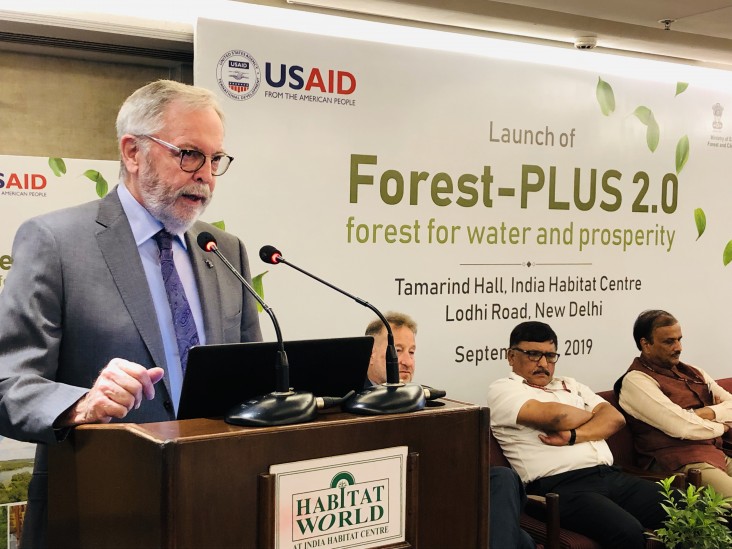India
- History
- Our Work
- Transforming Development Through Innovation & Partnership
- U.S.-India Triangular Cooperation
- Partnership for Energy Access and Security
- Partnership for Sustainable Forests in India
- Partnerships for Health
- Partnership for Education
- Partnership for Water Sanitation and Hygiene (WASH)
- Partnership for Food Security
- Partnership for Gender Equality
- Investing in Afghanistan
- Foreign Assistance Data
- Newsroom
- Newsletters and Fact Sheets
- Speeches
- Resources For Implementing Partners (RFIP)
- Careers
- Partnership Opportunities
- Success Stories
Press Release Shim
Speeches Shim

For Immediate Release
New Delhi: The United States Agency for International Development (USAID) and the Ministry of Environment, Forest and Climate Change (MoEFCC) of India officially launched today the “Forest-PLUS 2.0: forests for water and prosperity” program at an event in New Delhi.
Under the joint program, USAID will provide technical assistance to MoEFCC to improve management of forested landscapes in the states of Bihar, Kerala, and Telangana. The program will focus on developing tools and techniques to strengthen ecosystem-based management and the inclusion of ecosystem services in forest landscape management, and to enhance the inclusive economic opportunities that emerge from improved landscape management.
Speaking at the launch, USAID/India Acting Mission Director Keith E. Simmons acknowledged USAID’s long and successful partnership with India on land management and forestry. “Forest-PLUS 2.0, like its predecessor Forest-PLUS Program, once again brings together the best of Indian and American scientists, forest managers, and development specialists to protect and strengthen India’s forests. Under the new program, we hope to go beyond the successes of the previous program by improving forest management, enhancing the ecosystem services provided by forests, particularly water, and increasing economic opportunities for those dependent on forests,” Director Simmons said.
Mr. Siddhanta Das, Director-General of Forests & Special Secretary, MoEFCC, outlined the paradigm shift for management of forests from past for timber production to (a) conservation, carbon sequestration and (c) livelihood of forest dependent communities. He stressed on role of forest for water security, soil moisture conservation and catchment area treatment. Highlighting the importance of ecosystem services and the role that trees outside forests, he flagged the India’s commitment for achieving NDC targets and LDN targets. He said that making river perennial and rejuvenating of springs can be best indicator to monitor the progress in long run. Accordingly, there is a great need to incorporate such things in Working Plan Code for management of forests for water security. Automation of working plan will ease the works and bring a new dimension to field functionaries of forest department.
Mr. Das also remarked on the importance of this program to the ministry and how the models being piloted in the three landscapes of Bihar, Kerala, and Telangana will contribute to a paradigm shift in forest management in India.
More than 80 representatives and environment experts from government, academia, civil society, and the private sector attended the day-long launch event. Discussions highlighted the challenges and opportunities in forest landscapes and the plans within the three selected states to contribute to India’s aspirations of increasing forest and tree cover from 24 percent to 33 percent and enhance ecosystem services, including biodiversity, hydrological services, and carbon sequestration, through improved landscape management.
Representatives from the forest departments of Kerala, Bihar, and Telangana also presented the status of forestry and program-related activities in their respective states. They mentioned specifically how this program will assist them in preparing working plans and exploring more inclusive forest-based enterprises for their communities.

Comment
Make a general inquiry or suggest an improvement.